Table of Contents
In today’s business environment, delivery scheduling software is an important asset in transforming the complexities of distribution into streamlined, efficient, and highly manageable operations. This innovative software propels businesses into new heights of timely and reliable service by incorporating core functions such as Route Optimization, Real-Time Tracking, and Dynamic Scheduling.
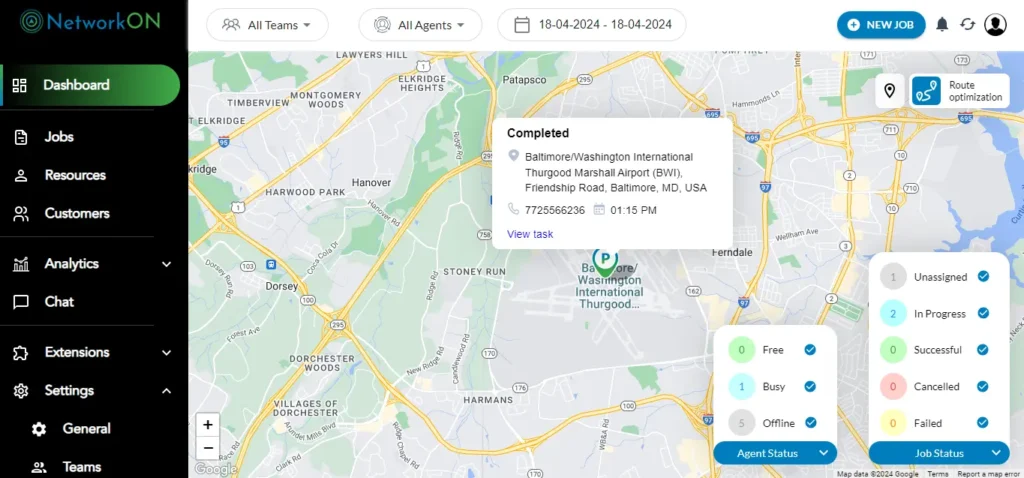
Whether you’re dispatching a small fleet or managing a vast distribution network, embrace the power of technology to ensure that every package reaches its destination with unprecedented precision and efficiency.
Understanding Delivery scheduling software
Delivery scheduling software is designed to streamline and automate the planning, management, and execution of delivery operations. This software assists businesses in scheduling deliveries efficiently, ensuring timely and accurate dispatch of goods. Key features typically include route optimization, real-time tracking, automated notifications, and integration with various transportation and inventory management systems.
The primary function of delivery scheduling software is to optimize delivery routes, reducing fuel costs and delivery times. By analyzing factors such as traffic conditions, delivery windows, and vehicle capacities, the software generates the most efficient routes for drivers. Real-time tracking allows businesses and customers to monitor the status of deliveries, enhancing transparency and customer satisfaction.
Automated notifications keep customers informed about their delivery status through messages or emails, reducing the need for manual communication. Integration capabilities enable seamless coordination between systems, such as order management and customer relationship management (CRM) software, ensuring a smooth flow of information and operations.
Delivery scheduling software helps businesses improve efficiency, reduce operational costs, and enhance customer service by ensuring timely, accurate, and well-coordinated deliveries. It is widely used in various industries, including retail, logistics, food delivery, and e-commerce.
The Benefits of Real-Time Tracking in Delivery Management
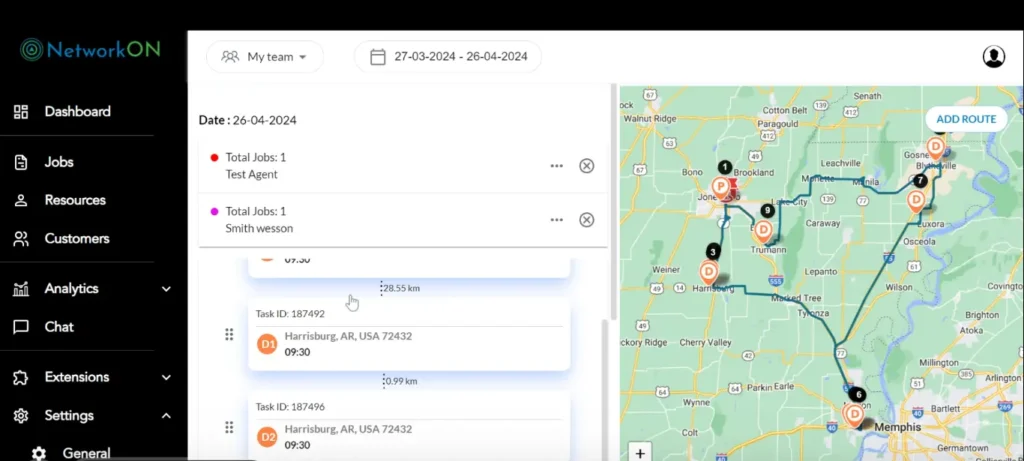
Real-time tracking in delivery scheduling software is about more than understanding where your fleet is at any moment. It’s a crucial tool that can transform the entire delivery lifecycle—from dispatching to the final mile. Let’s explore the advantages and how they contribute to an outstanding delivery process.
Ensuring Customer’s Peace of Mind with Accurate ETA Notifications
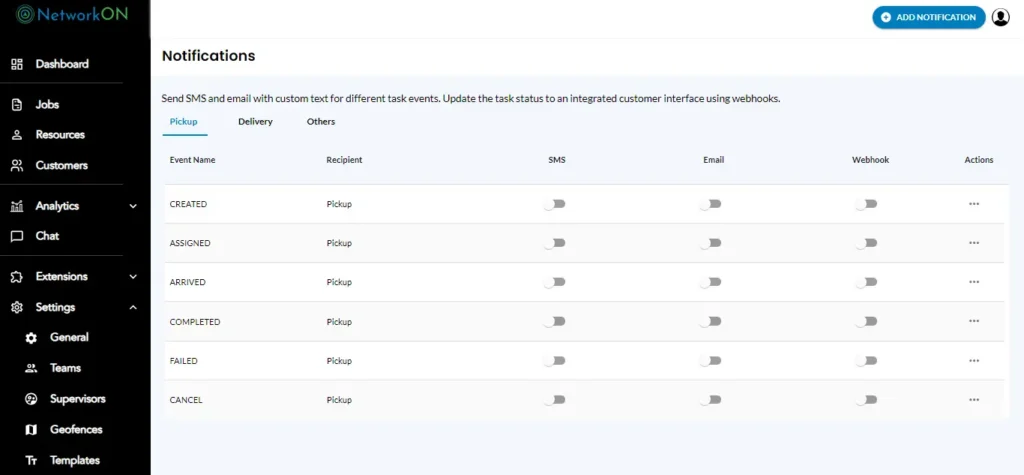
Customers today expect more than just a package at their doorstep; they seek certainty and communication. By leveraging real-time tracking, delivery scheduling software provides accurate ETA notifications, assuring customers about their parcel’s status. This transparency fortifies trust and reduces the anxious wait often associated with deliveries.
How Real-Time Tracking Empowers Management and Driver Efficiency
Efficiency in management and operations is essential for success. With real-time tracking features, fleet managers gain a better insight into operations, allowing swift decision-making and adjusting delivery routes on the fly. Drivers also benefit from decreased idle times and better on-road guidance, equating to more timely deliveries and efficient routes.
Pro Tip: By providing timely updates, customers stay informed about the progress of their deliveries. These notifications aren’t just a courtesy; they serve as indispensable tools that enhance the reliability of your service. Keeping clients in the loop reduces the number of customer service calls and builds a stronger reputation for reliability.
How Route Optimization Contributes to Cost Reduction Strategies
Route optimization is a cornerstone of economically sound strategies in delivery logistics. This advanced feature of delivery scheduling software not only streamlines operations but also delivers tangible cost savings. Businesses can significantly minimize fuel consumption by ensuring the most efficient paths are taken, reducing operational expenses.
Minimizing Fuel Use and Reducing Operational Costs
Every mile matters when it comes to delivery. Route optimization algorithms analyze various routes, considering distance, time, and vehicle capacity to calculate the most efficient path. By reducing unnecessary miles traveled, companies can lower their fuel costs and, consequently, their carbon footprint, positioning themselves as environmentally responsible while benefiting their bottom line.
The Impact of Traffic and Weather Adaptations on Route Planning
An often overlooked aspect of route optimization is its ability to adapt to real-time conditions such as traffic congestion and adverse weather. Delivery scheduling software equipped with route optimization technology can adjust routes on the fly, avoiding delays and maintaining on-time deliveries. This proactive approach not only helps conserve fuel by avoiding idling in traffic but also contributes to a consistent delivery schedule, thus boosting customer satisfaction and retention.
Vehicle Capacity Planning and Its Impact on Delivery Schedules
Maximizing delivery potential optimally loading vehicles is a cornerstone of efficient delivery scheduling. Efficient vehicle capacity planning ensures that each delivery trip is fully utilized, reducing the number of trips necessary and cutting fuel consumption and labor costs. It’s a straightforward equation: better-loaded vehicles equal more orders delivered per trip, which leads to increased profitability.
How software can assist in this process by providing sophisticated algorithms that consider the dimensions and weight of packages and the vehicle’s capacity. This ensures that every inch of space is used effectively. Delivery scheduling software with built-in capacity planning tools helps businesses minimize wasted space and deadhead trips or empty miles where drivers return without cargo, managing space effectively and reducing overall transport costs.
- Real-time adjustments: As conditions change, such as order cancellations or last-minute additions, vehicles can be re-optimized to accommodate these shifts.
- Historical data analysis: The software can analyze past delivery patterns to predict future needs and adapt vehicle loading strategies.
- Improved customer satisfaction: Customers receive their deliveries more consistently with more accurate loading and delivery times.
By leveraging the power of delivery scheduling software for vehicle capacity planning, businesses ensure that their operations efficiently meet the immediate delivery requirements and set themselves up for long-term success and customer satisfaction.
Dynamic Scheduling and Its Necessity for the Modern Business
Dynamic scheduling is a cornerstone in the delivery service industry, offering a solution to the business’s unpredictability. Adapting to spontaneous customer needs and traffic patterns has become essential in today’s fast-paced marketplace. Delivery scheduling software empowers businesses with adaptive scheduling tools to produce flexible delivery windows that can adjust in real-time, ensuring efficiency and reliability.
Addressing Unpredictability with Adaptable Delivery Windows
Continuous shifts in consumer demands and unexpected events necessitate a dynamic approach to delivery scheduling. Modifying delivery times and routes on the fly improves service reliability and increases customer satisfaction. By leveraging dynamic scheduling, businesses can respond to unforeseen circumstances swiftly, minimizing disruptions and maintaining delivery precision.
The Importance of Scalability for Business Growth Through Flexible Scheduling
As businesses aim for expansion, the scalability of their operations becomes crucial. A delivery scheduling software that supports flexible and scalable scheduling is imperative for such growth. This flexibility ensures that companies can easily adjust to increased delivery demands without sacrificing service quality or operational efficiency. Dynamic scheduling supports growth strategies by future-proofing delivery systems against the scaling challenges of an expanding customer base.
- Adapts to variable demand with ease, avoiding bottlenecks during peak times.
- Enables rapid scaling of delivery operations to match business growth.
- Anticipates fluctuations in supply chains, allowing for proactive adjustments.
Dynamic scheduling is not just a feature—it’s an integral component for businesses that wish to maintain a competitive edge in the modern digital landscape. By instituting a flexible, scalable approach to delivery management, companies can thrive amidst the challenges of contemporary commerce.
The Role of Automated Dispatching in Efficient Delivery Processes
In logistics, the significance of automated dispatching systems cannot be overstated. These systems transform conventional delivery processes into sophisticated, high-performance operations. By reducing manual intervention, automated dispatching enables companies to shift their focus towards more strategic decisions and enhance overall efficiency.
Reducing Manual Intervention and Enabling Focus on Strategic Decisions
Automated dispatching software is designed to take over the repetitive and time-consuming task of assigning deliveries. This alleviation of manual processes frees management teams to concentrate on refining delivery strategies and addressing complex issues requiring human insight and experience.
Efficient Utilization of Driver and Management Resources
With delivery scheduling software in place, businesses benefit from efficiently utilizing driver and management resources. The software’s sophisticated algorithms ensure drivers are dispatched according to the most optimized routes and schedules while considering constraints such as delivery windows, vehicle capacity, and driver availability.
- Streamlined Workflows: Automated tools provide streamlined workflows that can quickly adapt to changing conditions, ensuring that deliveries are not just on time but are managed with the most efficient use of resources.
- Enhanced Resource Allocation: The software systematically assigns deliveries to prevent overlaps and redundant runs. Driver workload is balanced, reducing fatigue and improving job satisfaction, which in turn helps maintain high service levels.
- Accurate Performance Tracking: Management teams gain the ability to track performance accurately, identifying areas that require additional support or improvement for continued operational excellence.
Automated dispatching plays a crucial role in streamlining delivery operations. By leveraging advanced delivery scheduling software, businesses can ensure that resources are allocated efficiently and focus is maintained on strategic growth and service quality enhancement.
Elevating Customer Experience with Proactive Customer Notifications
In the competitive realm of delivery services, the ability to elevate customer experience is a critical differentiator. Delivery scheduling software plays a paramount role in this aspect by integrating proactive customer notifications. These timely updates are a courtesy and a strategic tool that can significantly enhance customer satisfaction and loyalty.
Seamlessly Informing Customers About Delivery Statuses
Having insight into a delivery’s status is a valued convenience that customers have come to expect. Proactive notifications from delivery scheduling software ensure that customers are kept in the loop, providing real-time information that manages expectations and minimizes the need for customer-initiated inquiries. This seamless communication lets customers know when their packages will arrive, leading to a smoother delivery experience.
By proactively informing customers about the status of their deliveries and offering customizable alerts, your delivery scheduling software is not just enhancing the efficiency of your operations; it’s actively contributing to a more trustworthy and customer-centric brand image.
Ensuring Goods’ Safety with Proof of Delivery
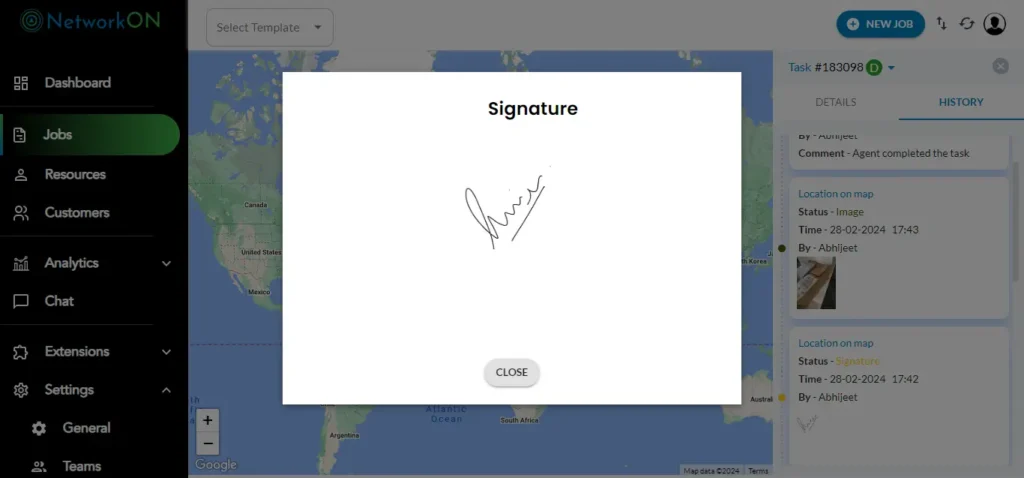
Proof of delivery is a critical component of modern delivery services, safeguarding both the sender and receiver of goods. Digital confirmation of deliveries not only provides peace of mind but also serves as an essential tool for avoiding and resolving disputes. The accountability it brings to the shipping process has become invaluable in a time when prompt and reliable delivery is not just appreciated but expected.
Utilizing delivery scheduling software significantly simplifies the proof of delivery process. This technology streamlines the capture and management of delivery confirmations, making it easy for drivers to collect signatures electronically, take photos of the delivered items, and even record notes about the delivery in real time directly from a mobile device.
- Digital confirmation of deliveries safeguards against disputes by ensuring that all parties have a tangible transaction record. This greatly reduces the likelihood of disagreements over whether goods have arrived in their intended condition.
- Software solutions simplify the proof of delivery process, improving efficiency by eliminating paper-based processes, reducing errors, and speeding up the confirmation procedure, thereby enhancing overall operational productivity.
In an industry where trust and reliability are paramount, having an authoritative and secure system for proving that goods have been delivered as agreed is non-negotiable. Delivery scheduling software with integrated proof of delivery capabilities provides the best way to confirm that your goods are delivered and protected every step of the way.
Maintain Compliance and Streamline Reporting
Delivery Scheduling Software is not only about ensuring that packages reach their destinations on time; it’s also critical for maintaining regulatory compliance and simplifying the intricacies of reporting. With increasing regulations in the logistics industry, companies must stay agile and ensure they are up-to-date with different compliance standards that vary by region and product. A robust delivery scheduling system can adapt to these variations, making compliance a seamless aspect of the delivery process.
Moreover, the right software streamlines reporting, providing management with organized and actionable insights. Accurate reporting is essential for making informed decisions, forecasting, and strategizing for future growth. Let’s delve into how a sophisticated delivery scheduling platform can help your business maintain compliance and streamline reporting:
- Adapts to adjustable compliance standards to meet the specific needs of varying regions and products, ensuring your business stays ahead of regulations.
- Facilitates management decision-making through organized, comprehensive reports on delivery performance, compliance status, and logistics efficiency.
By leveraging a delivery scheduling system focusing on compliance and reporting, businesses can mitigate risks and optimize their operations for better, more informed management. Embrace the future of delivery scheduling software to safeguard your operations and boost your reporting capabilities.
Seamless Integration with Existing Logistics Systems
Ensuring harmonious alignment with your current operations is crucial when adopting new technologies. Seamless integration of delivery scheduling software into existing logistics infrastructures is fundamental to maintaining uninterrupted workflows and optimizing overall efficiency. Compatibility is not just a convenience—it is a requirement for the software to bring tangible improvements to the delivery management process.
Ensuring a cohesive technological ecosystem
The value of delivery scheduling software lies in its ability to fit into your business’s unique technological framework without causing disruptions. A solution that seamlessly communicates with your Warehouse Management Systems (WMS), Transportation Management Systems (TMS), and Customer Relationship Management (CRM) platforms is key. This synergy ensures data coherence and provides a single point of truth for logistical decision-making.
The importance of software compatibility to enhance productivity
Software compatibility is a major driver of productivity. When delivery scheduling software is properly integrated, it eliminates the need for manual data entry and reduces the potential for human error. This fosters a more productive environment where logistics teams can focus on strategic tasks rather than managing data across disconnected systems. Delivery scheduling software designed to work with existing infrastructure simplifies operations. It paves the way for a smarter, more responsive delivery service.
Utilizing Analytics and Performance Metrics to Refine Delivery Services
In the competitive landscape of delivery operations, analytics, and performance metrics are pivotal in refining and optimizing delivery services. Delivery scheduling software streamlines the scheduling process and serves as a treasure trove of data that can aid in making informed decisions and elevating service quality.
Data-driven Insights for Constant Improvement
Businesses can continually adapt and improve their delivery operations by harnessing the power of data-driven insights generated from delivery scheduling software. Key performance indicators (KPIs) such as on-time delivery rates, customer satisfaction scores, and service times are transformed into actionable intelligence. This intelligence enables delivery services to react to the present and strategically plan for the future.
Exploring the Link Between Predictive Analytics and Predictive Maintenance Alerts
The integration of predictive analytics within delivery scheduling software is revolutionizing the maintenance of delivery fleets. The software can send predictive maintenance alerts by analyzing historical data patterns and recognizing trends before issues occur. This predictive approach to maintenance ensures fewer unexpected downtimes. It maintains continuity in delivery services, thus maintaining high reliability and customer trust.
- Monitoring vehicle health to address potential issues preemptively
- Forecasting delivery volumes for resource allocation
- Reducing risk factors by identifying problematic routes or practices
Delivery scheduling software empowers businesses to lock in a virtuous cycle of review and enhancement. Utilizing analytics and performance metrics is not merely about collecting data; it’s about translating that data into strategic action that refines delivery services. As this technology advances, the promise of more intelligent, efficient, and customer-focused delivery services becomes a tangible reality.
Implementing Cost Reduction Strategies via Delivery Scheduling Software
Efficient logistics management and operational cost reduction are essential to a thriving delivery-based business. Incorporating delivery scheduling software into your workflow can dramatically enhance these aspects by optimizing your delivery operations. This technology streamers processes and positively impacts your bottom line through significant cost reductions.
How Optimization Boosts the Bottom Line
Delivery scheduling software facilitates a multi-faceted approach to cost reduction by optimizing route planning, automating scheduling tasks, and assisting in effective resource management. By reducing fuel consumption, minimizing idle time, and ensuring drivers complete more deliveries in less time, your business can experience a noticeable decrease in expenses. Moreover, this optimization leads to a leaner operation, necessitating fewer resources for the same or even an enhanced level of service.
Preparing for Expansion: Scalability for Business Growth
As businesses evolve, the demand for robust delivery scheduling software becomes imperative to manage the current logistics and prepare for future growth. The scalability of your chosen software can make or break your ability to expand efficiently, ensuring that your investment today supports tomorrow’s success.
How software caters to the scalability needs of growing businesses
Scalable delivery scheduling software is designed to grow with your business. When you’re on the brink of expansion, your software should be equipped to handle increased order volumes, a larger fleet of vehicles, more complex routing, and the addition of new delivery services without skipping a beat. The right software seamlessly scales to meet these growing demands, enabling hassle-free expansion and capitalizing on new market opportunities.
The versatility of delivery scheduling software in diverse operational environments
The hallmark of excellent delivery scheduling software lies in its versatility. Different industries face diverse challenges and require solutions that can adapt to various operational environments – from bustling city logistics to sprawling rural deliveries. A versatile platform ensures that, as your business pushes into new markets or sectors, your delivery scheduling software will remain an ally, offering customizable features that mirror the unique demands of each new venture.
Streamlining Driver Management for Superior Service Delivery
Efficient driver management is a cornerstone of any successful delivery service. It ensures that packages reach their destinations on time and customers remain satisfied. Advanced delivery scheduling software is pivotal in optimizing driver operations, from improving communication to meticulously managing tasks.
Facilitating Communication and Task Allocation for Drivers
Clear communication channels are vital for drivers to receive real-time updates, alter routes on the fly, and report any issues immediately. Delivery scheduling software is the perfect platform for drivers and dispatchers to stay in sync. By leveraging these digital tools, every member of your fleet receives their tasks accurately, reducing misunderstandings and minimizing delays.
Impact of Efficient Driver Management on Overall Service Quality
There is a direct correlation between the effectiveness of driver management and the caliber of service delivery. With the right tools and information, drivers can perform their duties with greater precision and speed. Delivery scheduling software enables constant route optimization, timely delivery updates, and driver performance analytics, which are imperative for maintaining a high standard of service and building a reliable delivery brand.
- Enhanced driver satisfaction: By removing the guesswork from their day-to-day operations, drivers can focus on delivering the best possible service.
- Improved customer trust: Timely and accurate deliveries are the foundation of customer satisfaction and loyalty.
- Reduced operational costs: Streamlined driver management leads to fewer errors and more efficient resource use.
Anticipating Maintenance Needs with Predictive Maintenance Alerts
Delivery scheduling software streamlines the dispatching and routing processes. It plays a crucial role in maintaining the health of your fleet. Predictive maintenance alerts allow you to anticipate vehicle maintenance needs before they become critical.
Here’s how predictive maintenance is integral to keeping your delivery services consistently running:
Minimizing Downtime and Protecting Vehicles
Predictive maintenance, empowered by delivery scheduling software, minimizes vehicle downtime. By receiving alerts about potential vehicle issues, you can schedule repairs proactively, keeping your fleet on the road and your deliveries on schedule. This proactive approach to vehicle care helps to
- Reduce the likelihood of unexpected breakdowns.
- Extend the lifespan of your fleet.
- Lower overall maintenance costs in the long run
Role in Ensuring Consistent Service and Delivery Schedules
Maintaining consistent service and adhering to delivery schedules is pivotal for customer satisfaction and trust. Predictive maintenance alerts are a fundamental feature of robust delivery scheduling software. The capabilities include:
- Forecasting the optimal time for maintenance based on usage and wear
- Aligning maintenance schedules with delivery downtimes to avoid disruptions
- Ensuring that every vehicle is in top condition to deliver orders as promised
Predicting and preventing mechanical failures is invaluable in an industry where timing is everything. With predictive maintenance integrated into your delivery scheduling software, you’ll elevate your business’s reliability and operational efficiency to the next level.
Key Takeaways
- Delivery scheduling software optimizes routes, reduces fuel consumption, and minimizes operational costs, ensuring efficient delivery management and improved bottom lines.
- Real-time tracking and dynamic scheduling features allow adaptive route planning and accurate ETA notifications, boosting transparency, customer satisfaction, and operational reliability.
- Automated dispatching reduces manual intervention, freeing management to focus on strategic decisions. Proactive customer notifications enhance trust and reduce customer service inquiries.
- The software’s scalability supports business growth and integrates seamlessly with existing logistics systems, ensuring a cohesive technological ecosystem and uninterrupted workflows.
- Predictive maintenance alerts prevent unexpected downtimes, and proof of delivery features safeguard against disputes, ensuring vehicles are maintained efficiently, and deliveries are documented accurately.
Conclusion: Mastering Delivery Efficiency with the Right Software
Throughout our discussion, we have established the crucial role of delivery scheduling software in revolutionizing the logistics and transportation industry. From enhancing real-time tracking to optimizing routes, boosting vehicle capacity planning, and enabling dynamic scheduling, delivery management has been modernized to meet the demands of our fast-paced world.
The integration of automated dispatching, proactive customer notifications, and advanced analytics has redefined customer service and operational efficiency. Proof of delivery and compliance features ensure that businesses meet and exceed regulatory standards, providing peace of mind for providers and recipients of goods.
Ready to revolutionize your logistics operations? Embrace the power of advanced delivery scheduling software with NetworkON today! Whether you manage a small fleet or a vast distribution network, our cutting-edge software ensures every package reaches its destination precisely and efficiently.
Take the next step towards streamlined delivery operations. Contact NetworkON now to schedule a demo and see how our delivery scheduling software can elevate your business!
Frequently Asked Questions
Q1: How does delivery scheduling software optimize routes?
Delivery scheduling software uses advanced algorithms to analyze traffic conditions, delivery windows, and vehicle capacities. Processing this information generates the most efficient routes for drivers, reducing fuel consumption, delivery times, and operational costs.
Q2: Can the software handle real-time changes and updates?
Yes, the software has dynamic scheduling capabilities that allow it to adapt to real-time conditions such as traffic congestion, weather changes, and last-minute order adjustments. This ensures that delivery routes are optimized continuously and deliveries remain on schedule.
Q3: How does real-time tracking benefit my business and customers?
Real-time tracking provides businesses and customers with live updates on the status of deliveries. It offers better management insights and the ability to make swift business adjustments. It provides accurate ETA notifications for customers, enhancing transparency and trust and reducing the need for customer service inquiries.
Q4: Is the delivery scheduling software compatible with existing logistics systems?
Yes, the delivery scheduling software is designed to seamlessly integrate with various existing systems such as Warehouse Management Systems (WMS), Transportation Management Systems (TMS), and Customer Relationship Management (CRM) platforms. This ensures a cohesive workflow and eliminates manual data entry, improving overall efficiency and productivity.
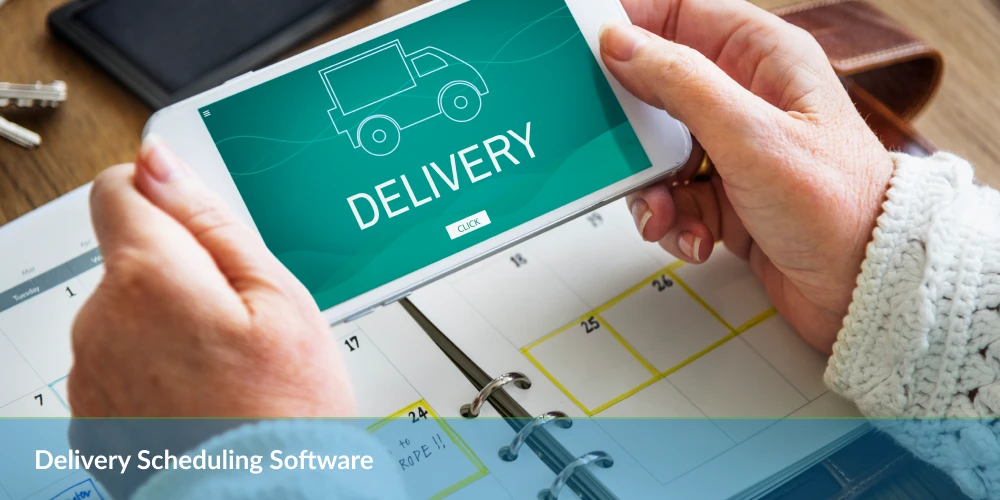

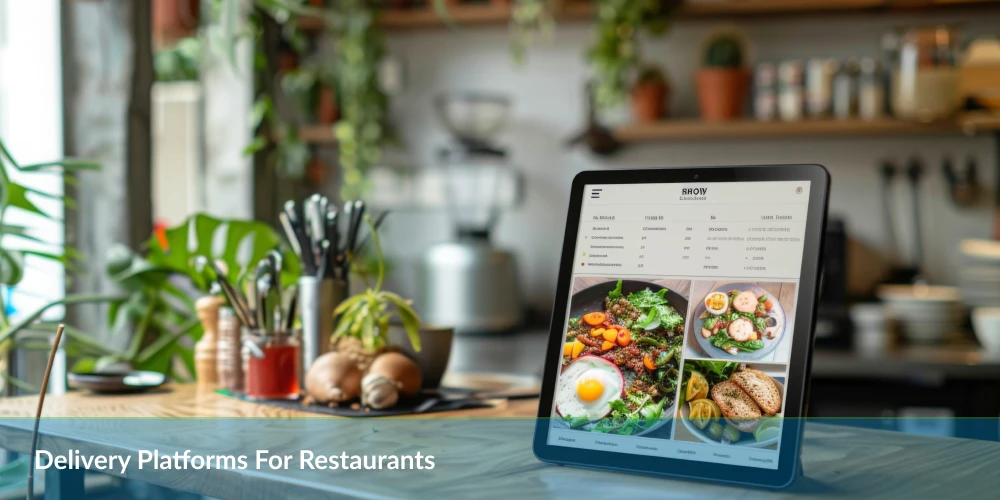


Jeffrey J. McClendon
Thanks for the informative post delivery scheduling software really does help streamline operations, especially when timing and coordination are critical. Whether you’re planning deliveries or managing event logistics, having a clear way to organize routes and communicate changes can make things much smoother. I’ve come across tools like https://mobisoftinfotech.com/solutions/event-transportation-software that help teams stay on top of schedules and details, and it connects well with many of the points you’ve made here. Appreciate the insights!